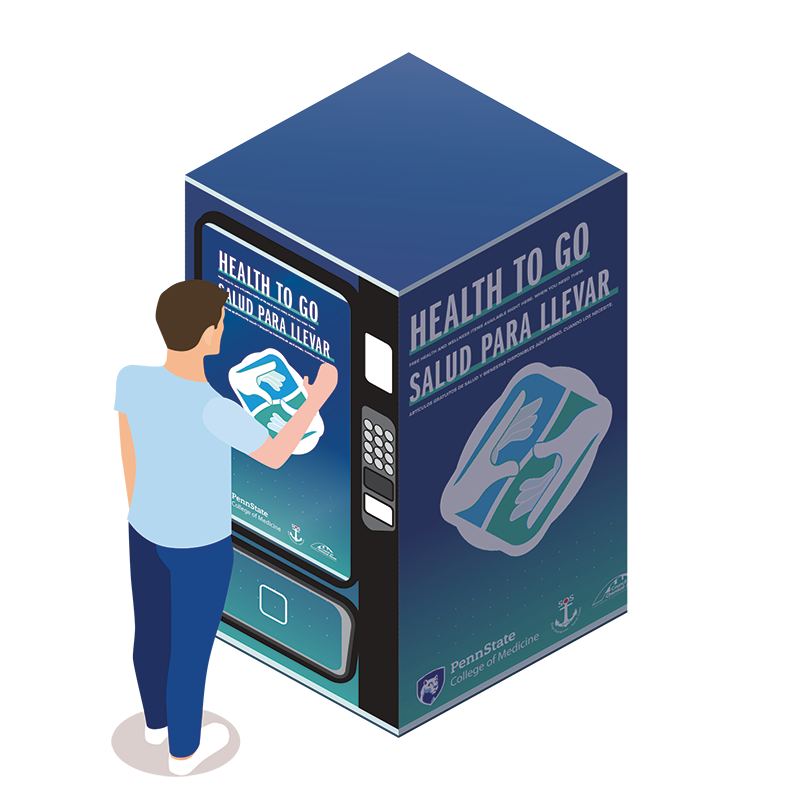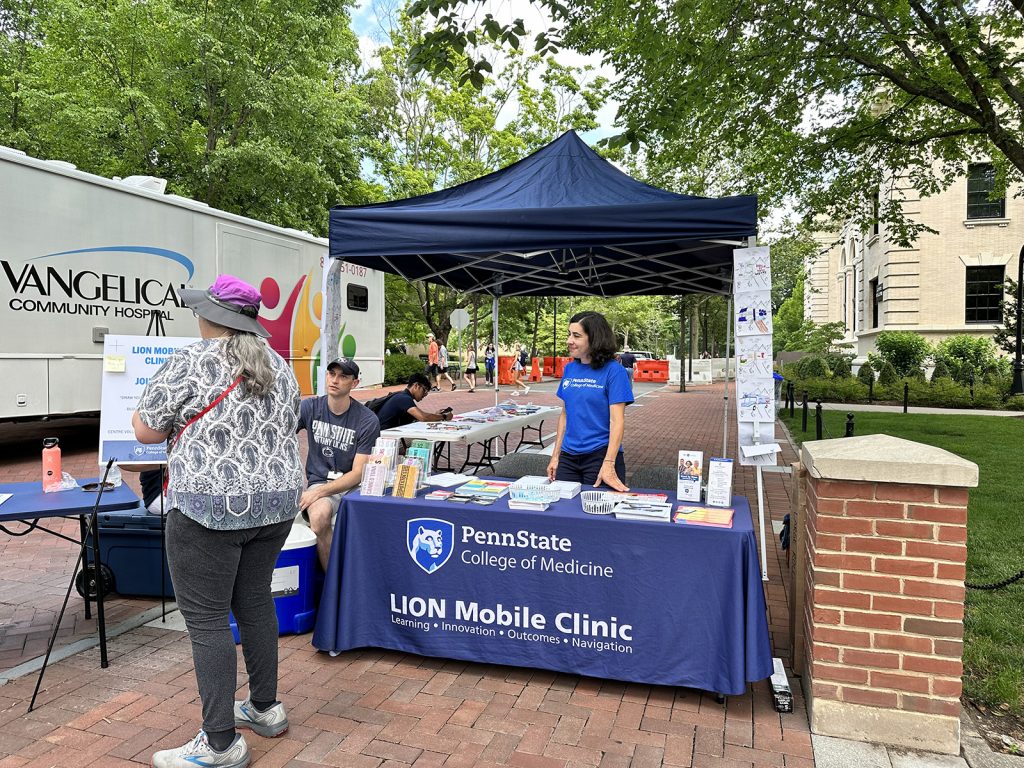A man using a nebulizer for treatment at home while having telemedicine healthcare assistance via laptop computer
Improving Rural Health Through Innovation
The Centers for Disease Control and Prevention shows that chronic diseases disproportionately impact rural populations. Root causes include reduced access to high-quality care, lower income levels and high minority populations, all of which can significantly exacerbate rural health disparities. Additionally, social determinants of health play a significant role including limited transportation, employment, childcare and food insecurities. Like many states across our nation, Pennsylvania is 70 percent rural which requires a collective, multisector approach to improve the health of each of these vulnerable communities.
The College of Medicine is committed to the University’s land-grant mission by training the next generation of health care providers, researchers, public health scientists and community members dedicated to working together to develop an inclusion innovation approach to combat the rural health disparities in Pennsylvania and beyond.
Battling the opioid epidemic with creative approaches like delivery drones, vending machines and weight loss medications
Rural communities suffer from higher rates of death from substance use disorders than those in urban communities. In fact, access to treatment facilities among rural residents takes twice as long as other populations, resulting in significant delays, or the inability to receive life-altering treatment and support. Through broad collaborations, Penn State College of Medicine is leading the way to provide innovative solutions to these pressing problems.

A multidisciplinary team led by Penn State College of Medicine’s Aleksandra Zgierska, MD, PhD, professor of family and community medicine, comprised of physicians, first responders, and drone and aviation experts are exploring the use of drones to deliver the overdose reversal drug, Naloxone, to hard-to-reach communities. Using the power and efficiency of drones in Pennsylvania’s Cambria County, where overdose deaths have skyrocketed, the goal is to create a scalable model for delivery drones to work in collaboration with emergency responders during medical emergencies to reduce response time in already-underserved areas.

Vending machines aren’t just for snacks. Researchers co-led by Alice Zhang, MD, MPH, assistant professor of family and community medicine and Zgierska, have identified an innovative way to address diseases of despair and health disparities in Harrisburg and Reading, Pennsylvania, by utilizing vending machines to provide free harm reduction tools including Naloxone, Fentanyl test strips and contraceptives. Working with community organizations and government officials, the vending machines will be placed in highly visible and easily accessible locations to encourage the use of the available free products.

Sadly, substance abuse disorders including opioid use disorders and the accompanying standard of care, Medication Assisted Treatment are highly stigmatized. What if there was another effective way? College of Medicine researchers Patricia Grigson-Kennedy, MS, PhD, and Scott Bunce, PhD, MA , are the first in the country to test the efficiency of Glucagon-like peptide-1 receptor agonists (GLP-1RAs) like liraglutide (Saxenda®) and semaglutide (Ozempic®) for the treatment of opioid use disorder in people. Findings suggest that the GLP-1R agonist, liraglutide, is safe and effective in reducing cravings in opioid use disorder.
Addressing health inequities in rural communities and beyond

Heart disease, cancer, diabetes and stroke are among the most common causes of illness, disability and death in the United States. They are also leading drivers of the nation’s $4.1 trillion in annual health care costs. These chronic conditions—and the factors that lead to them—are more common or severe for some racial and ethnic groups.
The College of Medicine has secured more than $10 million in CDC-funded Racial and Ethnic Approaches to Community Health grant funding to address these disparities among Hispanic populations in central Pennsylvania. Led by Jennifer Kraschnewski, MD, MPH, director of Penn State’s Clinical and Translational Science Institute, the project connects researchers and clinicians to community partners and coalitions to identify and support systemic issues where health gaps remain.
Non-Hispanic and Hispanic Black bisexual women who live in rural areas have the highest prevalence of experiencing suicidal thoughts and behaviors, according to Lauren Forrest, PhD, assistant professor of psychiatry and behavioral health. This “first-of-its-kind study,” published in JAMA Psychiatry, revealed how various demographic factors intersect to affect a person’s risk of having suicidal thoughts and behaviors.
Researchers throughout the College of Medicine are committed to advancing scientific discoveries to improve health equity for minority and underserved populations.
Actively addressing needs in rural Pennsylvania

Penn State College of Medicine knows the most effective way to address rural health disparities is through the intersection of scientific innovation and access to high-quality clinical care. Through research, education, clinical care and community outreach, Penn State faculty, staff and students are making a positive impact on residents of the Commonwealth and beyond.
Pediatrician and researcher, Deepa Sekhar, MD, spearheads a project to develop a community-based program to better prepare children living in rural Dauphin County for kindergarten who otherwise cannot enroll in preschool. These community needs and subsequent solutions were identified and developed during a community engagement event, hosted by Penn State Clinical and Translational Science Institute, highlighting the importance of community-centered approaches.
As future providers, students at the College of Medicine’s University Park Curriculum gain first-hand experience in caring for and creating opportunities to improve the health of rural Pennsylvanians. The LION Mobile Clinic, led by Michael McShane, MD, assistant professor in the department of medicine, uses a student-led free clinic model to increase access to health care, address food insecurity, promote economic development and enhance sustainability practices in under-resourced communities across the Commonwealth. The clinic is helping to prepare the next generation of community-centered clinicians and empowering residents in rural communities to become healthier.
